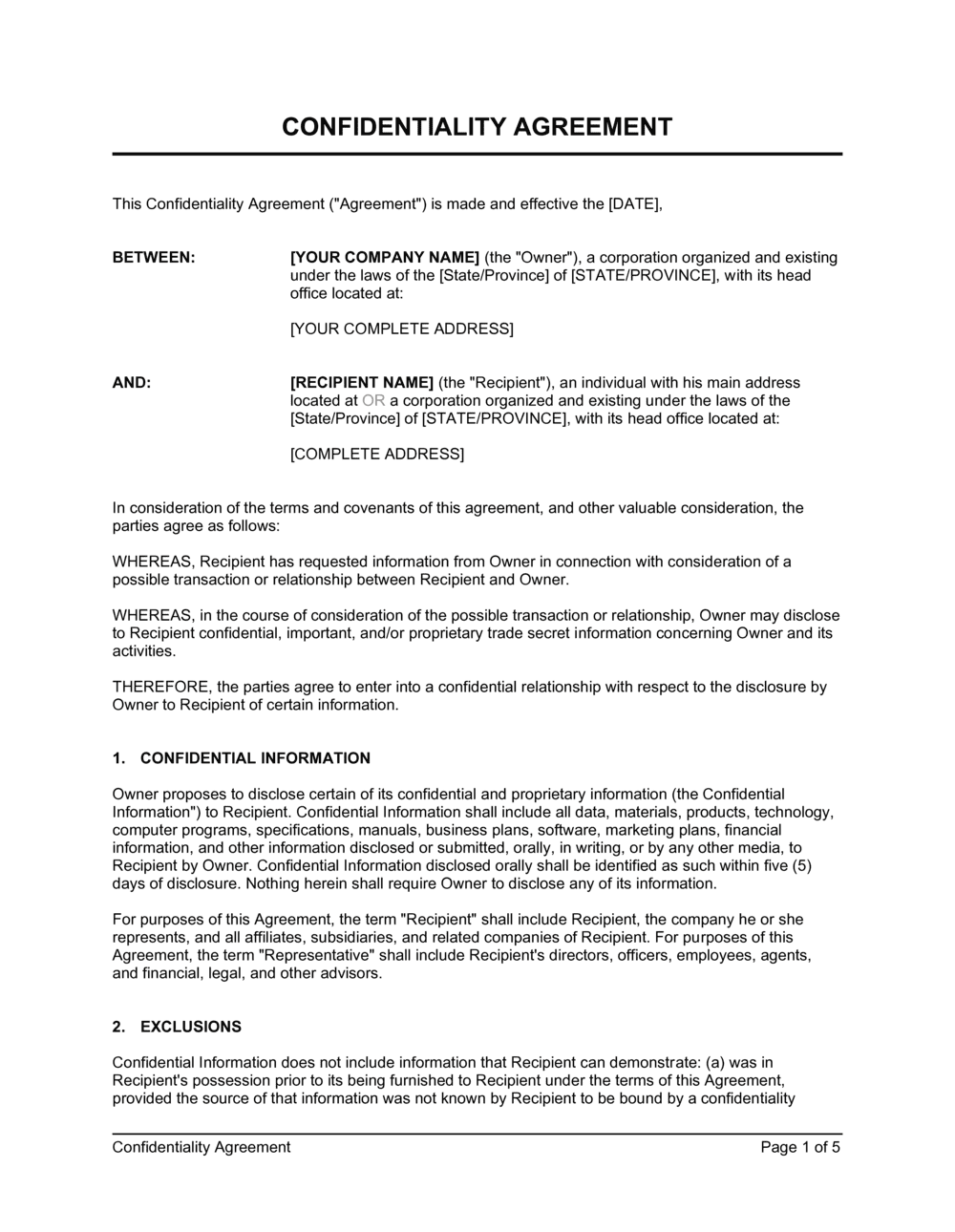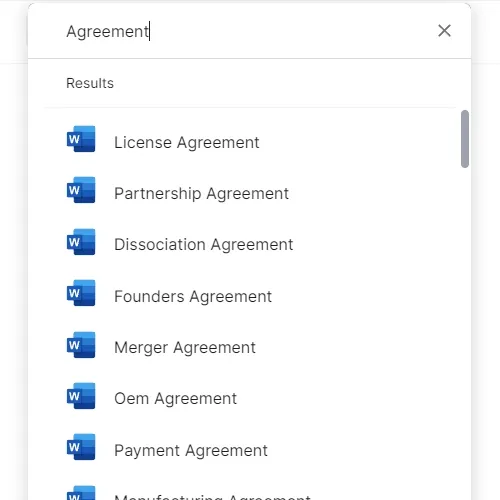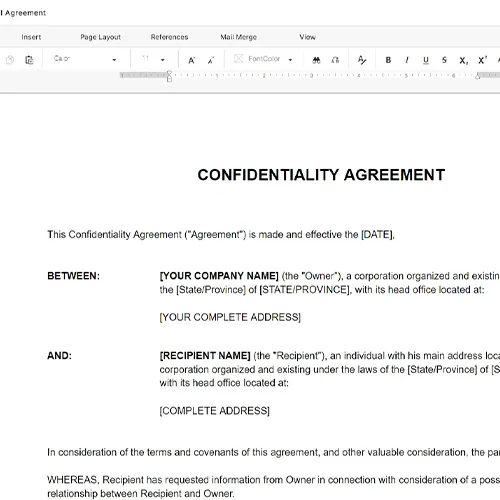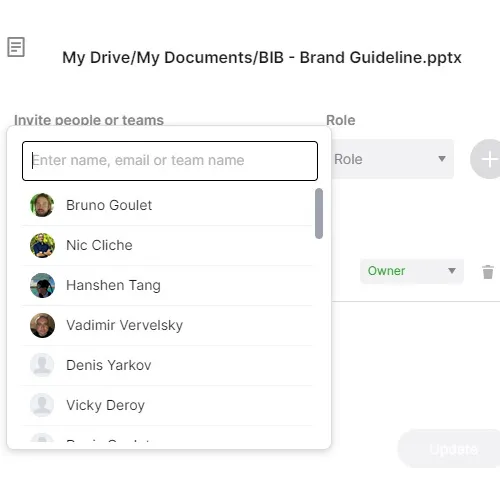Confidentiality Agreement Template

Understanding a Confidentiality Agreement
When it comes to making sure your documents remain confidential and anonymous, confidentiality agreements are massively important. Indeed, this is imperative for many different types of files. And so, it’s essential that you know how to use and write the agreements. Today, we’ll be looking at what confidentiality agreements are and how they can benefit your business. Moreover, we’ll consider how to write your own confidentiality agreements and why confidentiality agreement templates could be the solution that you need.
What Are Confidentiality Agreements?
Firstly, we need to define what confidentiality agreements actually are. Confidentiality agreements are documents designed to provide your business with confidentiality protection. That is to say, these documents establish the legal requirements of involved parties not to share any information contained within sensitive documents or otherwise learned through interactions.
Sometimes, a confidentiality agreement might be referred to as a non-disclosure agreement. Both names provide an overview of the documents’ purpose: to guarantee that shared information is managed privately and not disclosed.
The Basics of Confidentiality Agreements
At the most basic, a confidentiality agreement serves to outline the confidentiality requirements of an interaction. The confidentiality agreement sets out the relationship between the involved parties. It provides protection for the information that is shared during these aforementioned interactions.
In other words, involved parties may use a non-disclosure agreement to enforce confidentiality regulations legally. It sets out what the parties involved can and cannot share with members of the public.
Purposes of Confidentiality Agreements
Confidentiality agreements pretty much do what they say on the label: they establish the rules surrounding confidentiality for a relationship. As such, they protect against the shared information being leaked or shared to those individuals who may use it for ulterior motives than the original.
Commonly, an entity will create confidentiality agreements in situations where sensitive information is being handled. Examples of cases where businesses or entities use confidentiality agreements might include:
- Before or during joint venture discussions - Non-disclosure agreements at these times prevent a participant from discussing joint ventures, then taking the agreements to another partner. This protects both or all parties involved with the confidentiality agreements.
- Employees who are starting on a new contract - Businesses that hire new staff often have their staff members fill out a non-disclosure form or confidentiality agreement. By doing so, staff cannot share internal, confidential information with rival firms/members of the public.
- During pre-release discussions and editing - Before a document is released to the public, a confidentiality agreement may be required. In this scenario, the confidentiality agreements serve to protect the data and information until such a time as it’s made publicly available.
- For sharing creative content - If you’ve produced creative content (for example, a book or artwork) and want to share it before it goes public, confidentiality agreements can help. The confidentiality agreement can prevent other people from distributing the work that you have created.
This is just a very limited list of examples of where a confidentiality agreement may be required. Indeed, you can draw up confidentiality agreements for use in any situations where you think an extra layer of data protection might be necessary. In doing so, you will protect the information from being shared with individuals or firms who do not share the same ethics and/or goals as your business.
Thus, the most notable purpose of confidentiality agreements is keeping plans secret. This is important in many ways, including marketing strategies, private new products and innovations, and the like.
Limitations for Confidentiality Agreements
Confidentiality agreements only outline the legal requirements associated with information and the regulations around sharing this information. As such, there are a few limitations to confidentiality agreements that should be considered. The most obvious limiting factors for confidentiality agreements are as follows.
First, you should be aware that a confidentiality agreement can only do so much to protect your data. While confidentiality agreements can make it illegal for any parties involved in the agreement to share information, there’s still plenty to be said for human error. An individual could still accidentally share the data through a slip of the tongue. While you would still be able to file a case against them, they may have compromised the sensitive info by then.
What’s more, the confidentiality agreement is only binding if all parties involved have signed it. As such, all involved individuals should ensure that they (and their fellow parties) have signed the agreement before any data is shared.
Of course, it is always important that the confidentiality agreement is thorough. Indeed, any loopholes could allow parties to share information and data safely without any repercussions. As such, it’s always vital you get professional legal advice for your confidentiality agreements. Moreover, starting with confidentiality agreement templates can give you a sound basis for your confidentiality agreements.
What to Include in Confidentiality Agreements
If you think that a confidentiality agreement might be the right solution for your needs, then it’s important to consider what you should include carefully. Luckily, we’re on hand to help you develop the ideal confidentiality agreement templates for your needs!
A good confidentiality template needs to include a few key points. These are summarised as follows:
- The contact information (i.e. names, address, telephone number) of everyone who is involved with the confidentiality agreements
- Definition of what content and information is deemed confidential by the agreement
- Define when participants in the NDA can use the information and for what purposes
- Duration of the confidentiality agreement / under what circumstances the contract will end
- Breach remedies and jurisdiction clauses, in the event of information being shared against the terms of the non-disclosure agreement
Always Get a Second Opinion
A non-disclosure agreement is, first and foremost, a legally binding document. As a result of this, it is imperative that you get your confidentiality agreements right. Hence, before sending any confidentiality documents, it is imperative that you get a second opinion on the file. Ideally, you should seek this second opinion from a professional legal expert. However, getting second opinions from your colleagues or employees may also be suitable. These second opinions on the work will inform you whether you’ve written your confidentiality agreement well and without loopholes or errors.
Confidentiality Agreement Templates
If you need to create a confidentiality agreement for your firm, business, or creative work, you might be struggling to start. Indeed, getting started with writing a confidentiality agreement can be incredibly difficult! If this is the case for you then you may wish to use confidentiality agreement templates to determine the best legal solution for your needs.
Are Confidentiality Agreement Templates a Good Option?
Have you ever considered using confidentiality agreement templates to write your NDA? If you need an NDA, it’s essential you include all of the vital information to make it a success. However, many people don’t know where to start. This is where a template could come in handy.
But are confidentiality agreement templates actually a good option for you to consider? There are a many different reasons why you might want to use confidentiality agreement templates instead of writing your non-disclosure agreement freeform.
- Make sure the formatting for your confidentiality agreement is right. It can be incredibly challenging to come up with an effective layout for your agreement, and there are so many things to consider. What parts of the file should come first? How should the agreement be laid out? Well, using confidentiality agreement templates can be extremely useful to this end, as the template will come with all the formatting pre-designed. So, you won’t need to spend lots of time considering how to format your confidentiality agreements when using a template.
- Professional design and content planning. If you decide to use a confidentiality agreement template, you can be confident that the template has been made by a professional. And, when it comes to legal documentation that’s designed to protect the privacy of your content, getting things right really can’t be stressed highly enough. So, you should always ensure that you’ve had a professional opinion for the agreement – and a template could be a great way to get started with this.
- Confidentiality agreement templates improve your firm’s efficiency. Efficiency is, invariably, one of the most important aspects of a successful business. Poor efficiency will mean that your firm’s productivity is lesser but with the costs being the same or higher. By contrast, if your business is running efficiently, you can be confident that you’ll be getting the best value-for-money from your staffing costs. So, why get your business’ staff to do a job that they aren’t trained for, which will invariably be a costly way of doing things. Choose to use a confidentiality agreement template instead. You will likely cut out a considerable amount of the costs associated with the draft!
- Your staff knows the business better than anyone. This is something that many people don’t consider, but it’s essential nonetheless. When drafting a confidentiality agreement, you need to make sure that the content is relevant to your business or creative project. Unfortunately, though, many people – even lawyers and legal experts – won’t understand your business or project as you do. This is pretty much a given. What’s more, this is a critical reason that you may want to try confidentiality agreement templates!
- Hiring a legal expert is costly. The costs associated with a confidentiality agreement should not be the sole deciding factor. With that being said, it’s still worth noting that hiring a legal expert to help you write your confidentiality agreements will be expensive. Therefore, choosing confidentiality agreement templates instead can save you a considerable amount of money for drafting your NDA.
Where to Find Confidentiality Agreement Templates?
If you think that you need a confidentiality agreement, then confidentiality agreement templates can be incredibly useful. They can allow you to quickly and easily compose a non-disclosure agreement. What’s more, if you’ve chosen a template that a professional confidentiality agreement templates creator has written, you can be confident that the template will guide you to include all necessary information.
Don’t get caught out without the right confidentiality agreements template. We pride ourselves on offering a generous range of the highest quality confidentiality agreement templates. Our templates are designed to be easy to use and reliable. That is why so many people have chosen to create their confidentiality agreements with our range of templates.
Sign Up to Find Your Ideal Confidentiality Agreement Templates Today!
If you’ve been looking for the highest quality confidentiality agreement templates, then look no further than our range. We’re proud to offer the finest templates for confidentiality agreements. We have made all of our templates with professionalism and reliability in mind.
Do not compromise. Sign up to Business-in-a-Box to get access to our expansive collection of over 3,000+ templates. There’s sure to be a template that meets your needs for a high-quality confidentiality agreement template.
Reviewed on

Understanding a Confidentiality Agreement
When it comes to making sure your documents remain confidential and anonymous, confidentiality agreements are massively important. Indeed, this is imperative for many different types of files. And so, it’s essential that you know how to use and write the agreements. Today, we’ll be looking at what confidentiality agreements are and how they can benefit your business. Moreover, we’ll consider how to write your own confidentiality agreements and why confidentiality agreement templates could be the solution that you need.
What Are Confidentiality Agreements?
Firstly, we need to define what confidentiality agreements actually are. Confidentiality agreements are documents designed to provide your business with confidentiality protection. That is to say, these documents establish the legal requirements of involved parties not to share any information contained within sensitive documents or otherwise learned through interactions.
Sometimes, a confidentiality agreement might be referred to as a non-disclosure agreement. Both names provide an overview of the documents’ purpose: to guarantee that shared information is managed privately and not disclosed.
The Basics of Confidentiality Agreements
At the most basic, a confidentiality agreement serves to outline the confidentiality requirements of an interaction. The confidentiality agreement sets out the relationship between the involved parties. It provides protection for the information that is shared during these aforementioned interactions.
In other words, involved parties may use a non-disclosure agreement to enforce confidentiality regulations legally. It sets out what the parties involved can and cannot share with members of the public.
Purposes of Confidentiality Agreements
Confidentiality agreements pretty much do what they say on the label: they establish the rules surrounding confidentiality for a relationship. As such, they protect against the shared information being leaked or shared to those individuals who may use it for ulterior motives than the original.
Commonly, an entity will create confidentiality agreements in situations where sensitive information is being handled. Examples of cases where businesses or entities use confidentiality agreements might include:
- Before or during joint venture discussions - Non-disclosure agreements at these times prevent a participant from discussing joint ventures, then taking the agreements to another partner. This protects both or all parties involved with the confidentiality agreements.
- Employees who are starting on a new contract - Businesses that hire new staff often have their staff members fill out a non-disclosure form or confidentiality agreement. By doing so, staff cannot share internal, confidential information with rival firms/members of the public.
- During pre-release discussions and editing - Before a document is released to the public, a confidentiality agreement may be required. In this scenario, the confidentiality agreements serve to protect the data and information until such a time as it’s made publicly available.
- For sharing creative content - If you’ve produced creative content (for example, a book or artwork) and want to share it before it goes public, confidentiality agreements can help. The confidentiality agreement can prevent other people from distributing the work that you have created.
This is just a very limited list of examples of where a confidentiality agreement may be required. Indeed, you can draw up confidentiality agreements for use in any situations where you think an extra layer of data protection might be necessary. In doing so, you will protect the information from being shared with individuals or firms who do not share the same ethics and/or goals as your business.
Thus, the most notable purpose of confidentiality agreements is keeping plans secret. This is important in many ways, including marketing strategies, private new products and innovations, and the like.
Limitations for Confidentiality Agreements
Confidentiality agreements only outline the legal requirements associated with information and the regulations around sharing this information. As such, there are a few limitations to confidentiality agreements that should be considered. The most obvious limiting factors for confidentiality agreements are as follows.
First, you should be aware that a confidentiality agreement can only do so much to protect your data. While confidentiality agreements can make it illegal for any parties involved in the agreement to share information, there’s still plenty to be said for human error. An individual could still accidentally share the data through a slip of the tongue. While you would still be able to file a case against them, they may have compromised the sensitive info by then.
What’s more, the confidentiality agreement is only binding if all parties involved have signed it. As such, all involved individuals should ensure that they (and their fellow parties) have signed the agreement before any data is shared.
Of course, it is always important that the confidentiality agreement is thorough. Indeed, any loopholes could allow parties to share information and data safely without any repercussions. As such, it’s always vital you get professional legal advice for your confidentiality agreements. Moreover, starting with confidentiality agreement templates can give you a sound basis for your confidentiality agreements.
What to Include in Confidentiality Agreements
If you think that a confidentiality agreement might be the right solution for your needs, then it’s important to consider what you should include carefully. Luckily, we’re on hand to help you develop the ideal confidentiality agreement templates for your needs!
A good confidentiality template needs to include a few key points. These are summarised as follows:
- The contact information (i.e. names, address, telephone number) of everyone who is involved with the confidentiality agreements
- Definition of what content and information is deemed confidential by the agreement
- Define when participants in the NDA can use the information and for what purposes
- Duration of the confidentiality agreement / under what circumstances the contract will end
- Breach remedies and jurisdiction clauses, in the event of information being shared against the terms of the non-disclosure agreement
Always Get a Second Opinion
A non-disclosure agreement is, first and foremost, a legally binding document. As a result of this, it is imperative that you get your confidentiality agreements right. Hence, before sending any confidentiality documents, it is imperative that you get a second opinion on the file. Ideally, you should seek this second opinion from a professional legal expert. However, getting second opinions from your colleagues or employees may also be suitable. These second opinions on the work will inform you whether you’ve written your confidentiality agreement well and without loopholes or errors.
Confidentiality Agreement Templates
If you need to create a confidentiality agreement for your firm, business, or creative work, you might be struggling to start. Indeed, getting started with writing a confidentiality agreement can be incredibly difficult! If this is the case for you then you may wish to use confidentiality agreement templates to determine the best legal solution for your needs.
Are Confidentiality Agreement Templates a Good Option?
Have you ever considered using confidentiality agreement templates to write your NDA? If you need an NDA, it’s essential you include all of the vital information to make it a success. However, many people don’t know where to start. This is where a template could come in handy.
But are confidentiality agreement templates actually a good option for you to consider? There are a many different reasons why you might want to use confidentiality agreement templates instead of writing your non-disclosure agreement freeform.
- Make sure the formatting for your confidentiality agreement is right. It can be incredibly challenging to come up with an effective layout for your agreement, and there are so many things to consider. What parts of the file should come first? How should the agreement be laid out? Well, using confidentiality agreement templates can be extremely useful to this end, as the template will come with all the formatting pre-designed. So, you won’t need to spend lots of time considering how to format your confidentiality agreements when using a template.
- Professional design and content planning. If you decide to use a confidentiality agreement template, you can be confident that the template has been made by a professional. And, when it comes to legal documentation that’s designed to protect the privacy of your content, getting things right really can’t be stressed highly enough. So, you should always ensure that you’ve had a professional opinion for the agreement – and a template could be a great way to get started with this.
- Confidentiality agreement templates improve your firm’s efficiency. Efficiency is, invariably, one of the most important aspects of a successful business. Poor efficiency will mean that your firm’s productivity is lesser but with the costs being the same or higher. By contrast, if your business is running efficiently, you can be confident that you’ll be getting the best value-for-money from your staffing costs. So, why get your business’ staff to do a job that they aren’t trained for, which will invariably be a costly way of doing things. Choose to use a confidentiality agreement template instead. You will likely cut out a considerable amount of the costs associated with the draft!
- Your staff knows the business better than anyone. This is something that many people don’t consider, but it’s essential nonetheless. When drafting a confidentiality agreement, you need to make sure that the content is relevant to your business or creative project. Unfortunately, though, many people – even lawyers and legal experts – won’t understand your business or project as you do. This is pretty much a given. What’s more, this is a critical reason that you may want to try confidentiality agreement templates!
- Hiring a legal expert is costly. The costs associated with a confidentiality agreement should not be the sole deciding factor. With that being said, it’s still worth noting that hiring a legal expert to help you write your confidentiality agreements will be expensive. Therefore, choosing confidentiality agreement templates instead can save you a considerable amount of money for drafting your NDA.
Where to Find Confidentiality Agreement Templates?
If you think that you need a confidentiality agreement, then confidentiality agreement templates can be incredibly useful. They can allow you to quickly and easily compose a non-disclosure agreement. What’s more, if you’ve chosen a template that a professional confidentiality agreement templates creator has written, you can be confident that the template will guide you to include all necessary information.
Don’t get caught out without the right confidentiality agreements template. We pride ourselves on offering a generous range of the highest quality confidentiality agreement templates. Our templates are designed to be easy to use and reliable. That is why so many people have chosen to create their confidentiality agreements with our range of templates.
Sign Up to Find Your Ideal Confidentiality Agreement Templates Today!
If you’ve been looking for the highest quality confidentiality agreement templates, then look no further than our range. We’re proud to offer the finest templates for confidentiality agreements. We have made all of our templates with professionalism and reliability in mind.
Do not compromise. Sign up to Business-in-a-Box to get access to our expansive collection of over 3,000+ templates. There’s sure to be a template that meets your needs for a high-quality confidentiality agreement template.
Easily Create Any Business Document You Need in Minutes.

Download or open template
Access over 3,000+ business and legal templates for any business task, project or initiative.

Edit and fill in the blanks
Customize your ready-made business document template and save it in the cloud.

Save, Share, Export, or Sign
Share your files and folders with your team. Create a space of seamless collaboration.


